
Image downloaded from http://puentelibre.mx
The third World Baseball Classic ended early for the Cuban team and left many of us with wishes to see them win over their neighboring ball club and Cuban sports narrators with wishes to travel to the Californian city of San Francisco in the United States.
If the Classics have brought us anything positive, these have been the possibility of seeing good stadiums on television, quality officiating — despite the fact that it’s not perfect — and the possibility of comparing averages and the conditions of our stars with the records and the caliber of the ballplayers of other latitudes. Nobody understands why only they permit ours to contract with leagues from other countries like Venezuela, Mexico, Dominican Republic etc.; or why, when they retire, that they pay much less than to active ballplayers. To what or to whom do we owe this bad idea?
This Classic has been exceptional in that the games were broadcast of our teams and our commentators refer to them with respect . Could this be the preamble to a change of mentality or of flexibility of sports politics followed until now? A very little while ago we learned that the authorities respected their right to visit their country and the province of Pinar del Río, for pitcher José Ariel Contreras, who stayed abroad* on one of the trips with the Cuban baseball team and was contacted by the big leagues.
The “balls and strikes” athletes in my country play for love of the sport and in deplorable conditions in comparison with many other teams of the world. They train like professionals, but they are treated almost like slaves. All to defend an amateurism that played its propaganda role during the so-called revolutionary era, but in reality is erratic and oppressive.
Fields aren’t in optimal conditions, balls are counted and used too many time in each game, the officiating is horrible, and those chosen to make up the team that represents us internationally are victims of different pressures: seen off in political acts of our country’s leaders, “commitment to the Motherland”, speeches, display of the flag — as if they were going to war — and now, at last, also subject to the despotic attitudes of their manager.
I’ll continue defending my thesis that to be a manager you don’t have to have tyrannical characteristics or roots. In a frank summary of stress, personal needs are also present; the pressure of finding the time to go to the store to buy a team to replace Cuba’s broken one and other compromises. And to do it watched over by maybe it’s that the “guardian angels” that always accompany sports delegations which guarantee their safety suspect that it’s a pretext to stay abroad and act “in consequence”, as usual.
I can only imagine how our ballplayers feel interacting with those of the other countries in hotels and stadiums: like orphan children whose wealth is the “dignity” of playing according to the managers and the whim of a small political group and its political model in decadence. Beyond who ends up the winner of the Classic, there will also be the Cuban fan who will have won, who has expanded his culture of baseball, enjoyed other styles of play, of management, batting and pitching coaches, and above all, better conditions in which to develop, play, and enjoy our national pastime.
*Translator’s note: These ’defections’ of Cuban sports figures have been seen as treasonable acts by the Cuban Government in the past. The fact that a defector would be allowed to visit his family home is remarkable.
Translated by: JT
16 March 2013
